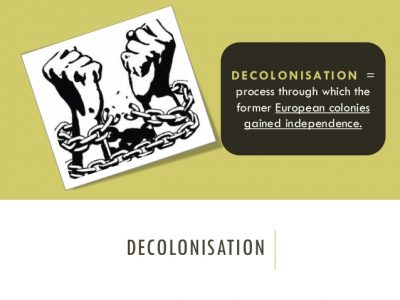Decolonising ‘Decolonisation’

By Robert Wood
In Australia, the question of decolonisation is a live and hot issue. It is there too in our neighbours, New Zealand, but the greater proportion of Indigenous Maori citizens changes the inflection, and elements of their collective culture, heritage, language are braided through the everyday conversation. In the Northern hemisphere, Canada has paid greater attention to First Nations compared to the United States. And Argentina and South Africa are different yet again. But in one way of organising our understandings of these nations, they are all settler societies that share a relationship to colonisation. This is an essay about that, where I was recently told by a (white) editor and a (non-indigenous cultural and linguistically diverse) reading assistant that I was unable to use the word ‘mabarn’ (‘magic’) in an essay. This was because it was the ‘annexation of a sacred Aboriginal word and poorly understood by whitefellas… this reads as ethnographic criticism’. To their minds, the very use of such a word was a form of profane appropriation.
For the record, I don’t think people speak ‘Aboriginal’ and so to propose that a word is ‘Aboriginal’ is like saying it is ‘Indian’ or ‘Chinese’. By analogy, do you mean Hindi or Tamil? Do you mean Cantonese or Mandarin? When speaking of Indigenous languages on this continent do we mean Bardi or Yolngu or any other of the few hundred that are still here, and always have been? At a stretch, one could propose there is Aboriginal English, but these are creolised Englishes that are regionally specific depending on the states from Queensland to the Northern Territory. We do not simply call them ‘Aboriginal’ either. In one region known as the Pilbara for example, missionaries encouraged traditional owners to call Wednesday ‘washing day’, and ‘surf’ is still used interchangeably with ‘laundry powder’ because of a brand association. These are vernacular dialects rather than traditional, local languages.
As I explained in my essay and in correspondence with the editors afterwards, I know ‘mabarn’ as a Ngarluma word even as it resonates with other Pama-Nyungan languages and is used by different groups beyond this specific one. Pama-Nyungan is one language family, like Romance languages, here in Australia, but not every Indigenous language belongs to it. And so, it is not immediately part of ‘Aboriginal’ lexicon even as it is from here. Furthermore, it is used in everyday conversations, not at the law ground exclusively, which makes it a common word not a sacred one. I use ‘mabarn’ in my everyday speech with my in-laws, who are traditional Indigenous owners, just like ‘wanja’ instead of ‘dog’ and ‘mulla’ instead of ‘meat’. This is to say nothing of the countless words that have passed from local languages into Australian English from place names to flora and fauna – you might know kangaroo or billabong.
Of course, there are words (and songs) that cannot be shared publically. This does not necessarily follow raced lines but degrees of initiation, which might be gendered or aged in particular. I know white men who have ‘been through’ Indigenous law. To think that every thing or every word that has a connection to Indigenous languages and people does a disservice to the things that actually are sacred. It undermines traditional law, authority and people while confining Indigenous peoples in general to being an otherworldly priestly type without secular culture that can be shared with everyone from Australia to America.
In addition, ‘whitefellas’ (ever the good liberal word to show you are in the know) have written about mabarn including Carl von Brandenstein, Ronald Berndt and AP Thomas. They know a lot more about it than the CALD reader in question and they are white and she is not. To immediately assume too that ‘ethnographic criticism’ is problematic would mean happily dismissing the work of Stephen Muecke in his Reading the Country let alone the whole fields of anthropology, ethnomusicology and linguistics. Those people have done and continue to do good work in communities, building up networks of relations and working with people on the ground with the aim of solidarity. This does not mean bad things have not also been done, but that to dismiss a whole area of inquiry is particularly problematic. Ethnographers can be ‘allies’, to use the parlance of our times, and one of the best expressions of socialist realism is Donald Stuart’s Yandy that writes this into existence.
The editorial feedback I received is conservative identity politics that would prefer to shut itself in a metropolitan ivory tower rather than engage with other cultures. It refuses to think about exchange, or of how to make our society better through expert and collective knowledge. It is the reification of authorial experience.
Instead, it was proposed that I use a dead, white, male theorist to read the book I had looked at, forgetting ‘marbarn’ and footnoting a text given to literary theory undergraduates at any Australian university. To propose using an empirical writer to read a book by someone who is Indigenous seems like a weak position when we have our own philosophical tools on this continent. Would editors prefer we knew the name ‘de Certeau’ or used ‘rhizome’ instead of safeguarding Indigenous languages through their respectful use in critical contexts? Should East Coast city intellectuals continue to abstract and extract local knowledge for academic points without having to return to communities after they have got what they wanted and published?
Is it better that we stop reading Indigenous writers because we ourselves are not Indigenous? And if we read other people, should we be expected to simply agree with them rather than engaging in considered, thoughtful debate and safe critique? Should we only read the people we are categorised with in raced terms, or for that matter, according to gender, sexuality, class, religion, region? Maybe we should only read ourselves, or those who are obviously like us because all appropriation is bad?
These are not idle questions. They are central to thinking about the place of organised thought and literature in Australia and settler societies like Canada and America. They speak to power, capitalism, identity, to questions of diversity and decolonisation in particular. This matters for how we speak about our own place and the editing process, which we need to decolonise by having diverse people in these roles together with those who have knowledge of the content they seek to publish.
This does not mean that we should stop reading Foucault or Deleuze, but that perhaps we should interrogate Althusser (who murdered his wife) and Heidegger (who was anti-Semitic). Only fear explains why those people are still read instead of having conversations about Indigenous intellectual life with living Indigenous intellectuals and community members themselves. English and continental European men do not have a lock on theory and cannot be the only things to read in a decolonising paradigm.
If people want to decolonise decolonisation here, it might be about looking at our own archive, about understanding what has happened in this place from David Unaipon in addition to Frantz Fanon, Oodgeroo Noonuccal in addition to Edward Said, just like Americans can look to a strong native leftism and a tradition of protest that is not simply liberal in its intention and language.
Collectively, we do not need to rely on the discursive frames of false masters who only seem to be fellow travellers. Instead of parroting what happened some time back on some distant shore, it might be about going to places to learn from Indigenous elders who remain connected to law. After all, we have to find our own autonomy that builds towards ongoing solidarity rather than mimicking a past negation of empire that is distant from people currently living outside the settler gaze but on our very continents, and in post-colonial nations of the global South as a whole. Otherwise, it reads as nostalgia of a naïve and vain kind, being anti-colonial not post- or de- in a true sense, which, surely, is not what we are looking for as we go around the sun once more neglecting the very mabarn in our midst.
 Robert Wood’s writing has been published in numerous literary and academic journals. He has interned for Overland, edited for Peril and Cordite, been a columnist for Cultural Weekly. At present he works for The Centre for Stories.
Robert Wood’s writing has been published in numerous literary and academic journals. He has interned for Overland, edited for Peril and Cordite, been a columnist for Cultural Weekly. At present he works for The Centre for Stories.









1 comment
Login here Register here-
wam
Return to home pageI fave always held, as the first principle for a teacher, that you cannot teach anyone from whom you cannot learn.
Australian society, in my 8 decades, has clung to the septic jew movies concept of booga booga and the power of the Aboriginal language is lost in ridicule.
Few missionaries or teachers can understand maths beyond arithmetic. All, teachers that I have spoken too have no acceptance of the process that allows 1 + 7 + 6 = 4.
They have no idea of the Aboriginal skill in advanced maths, recognising patterns nor in the memory and use of prior learning.
The consequence of such failings is the education department perpetuates a terrible education myth that Aboriginal people are limited to grade three level education.
This myth was described by Xavier when he was in charge of Kahlin.
I have been lucky enough to know some inmates and see the ridiculous limit grade 3 was then.
The current education system has a year 12 certificate which has a minimum standard of (surprise surprise) grade 3. This comes with a safety net of teacher student being able of negotiating a lower standard.
The true colonisation principle of figjam is still rampant and any ‘mabam’ is hidden under the reams of ‘we know what is best for Aboriginal’ people’.